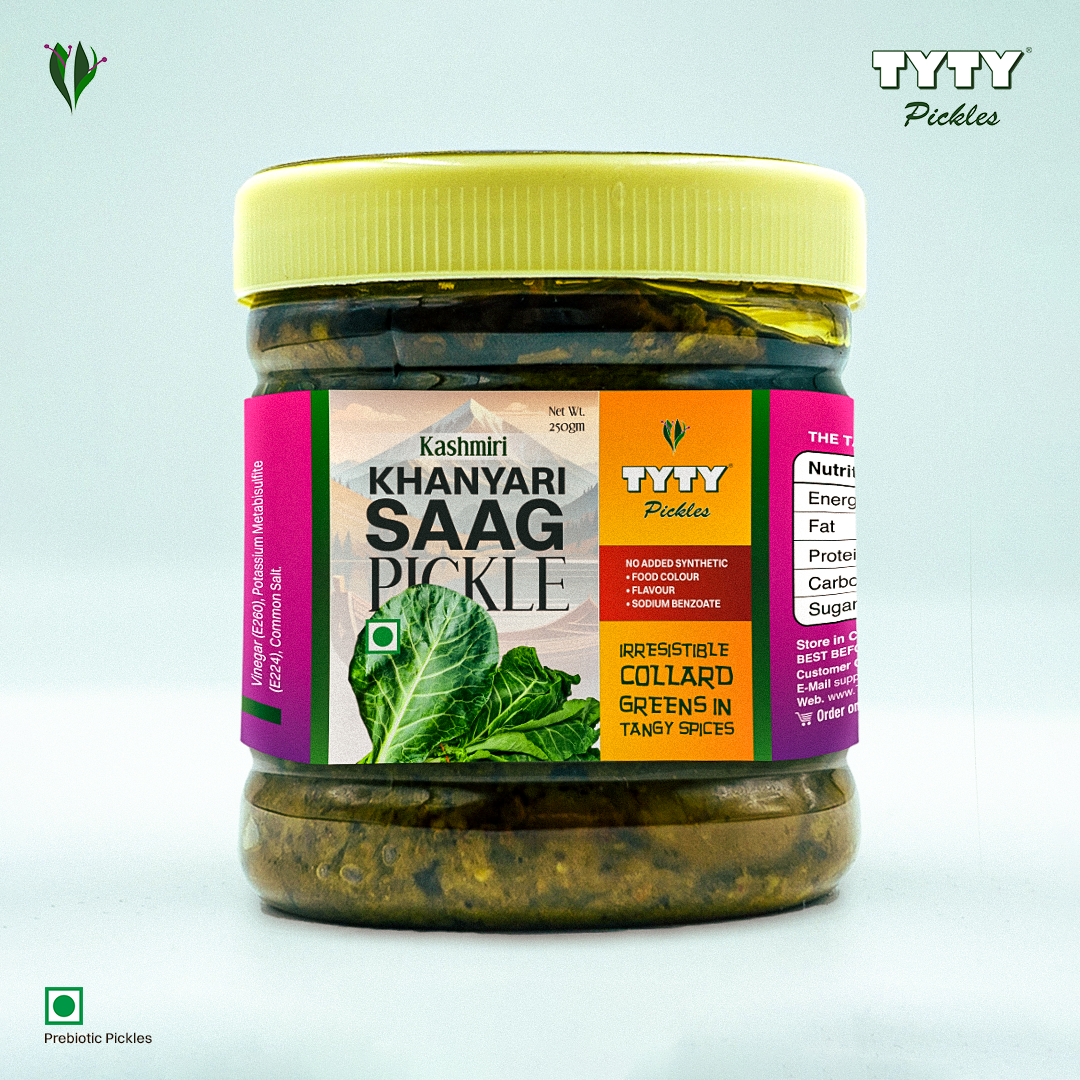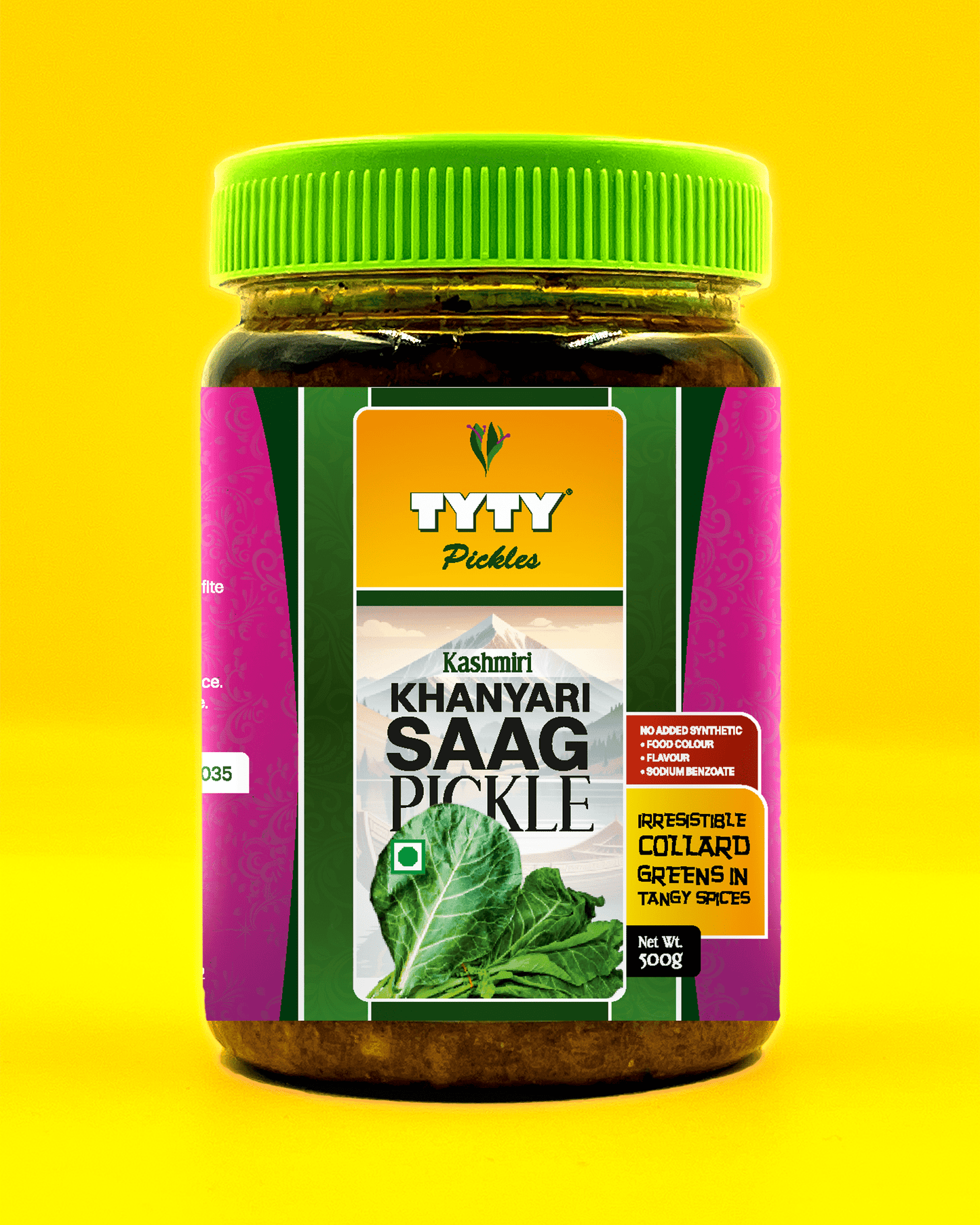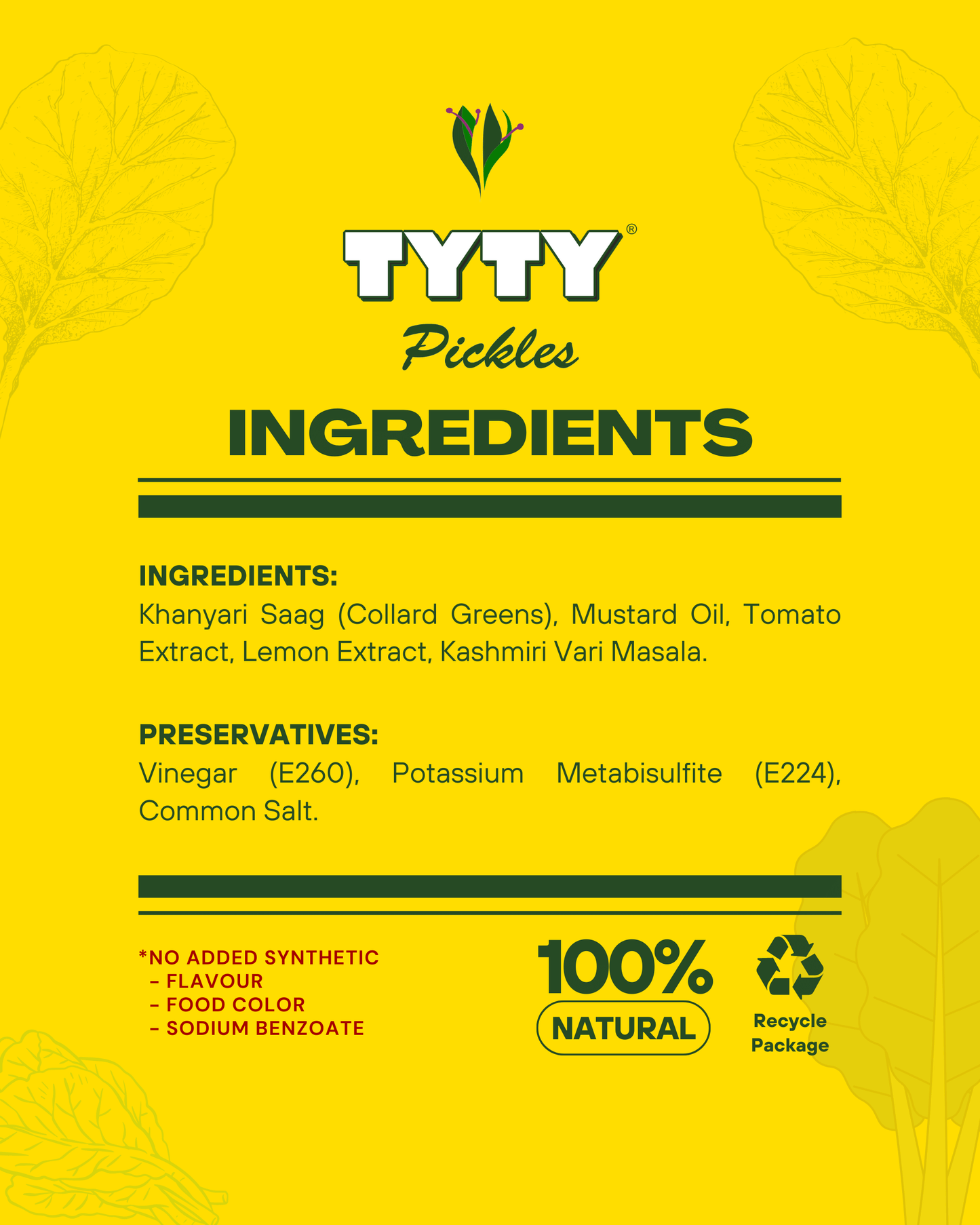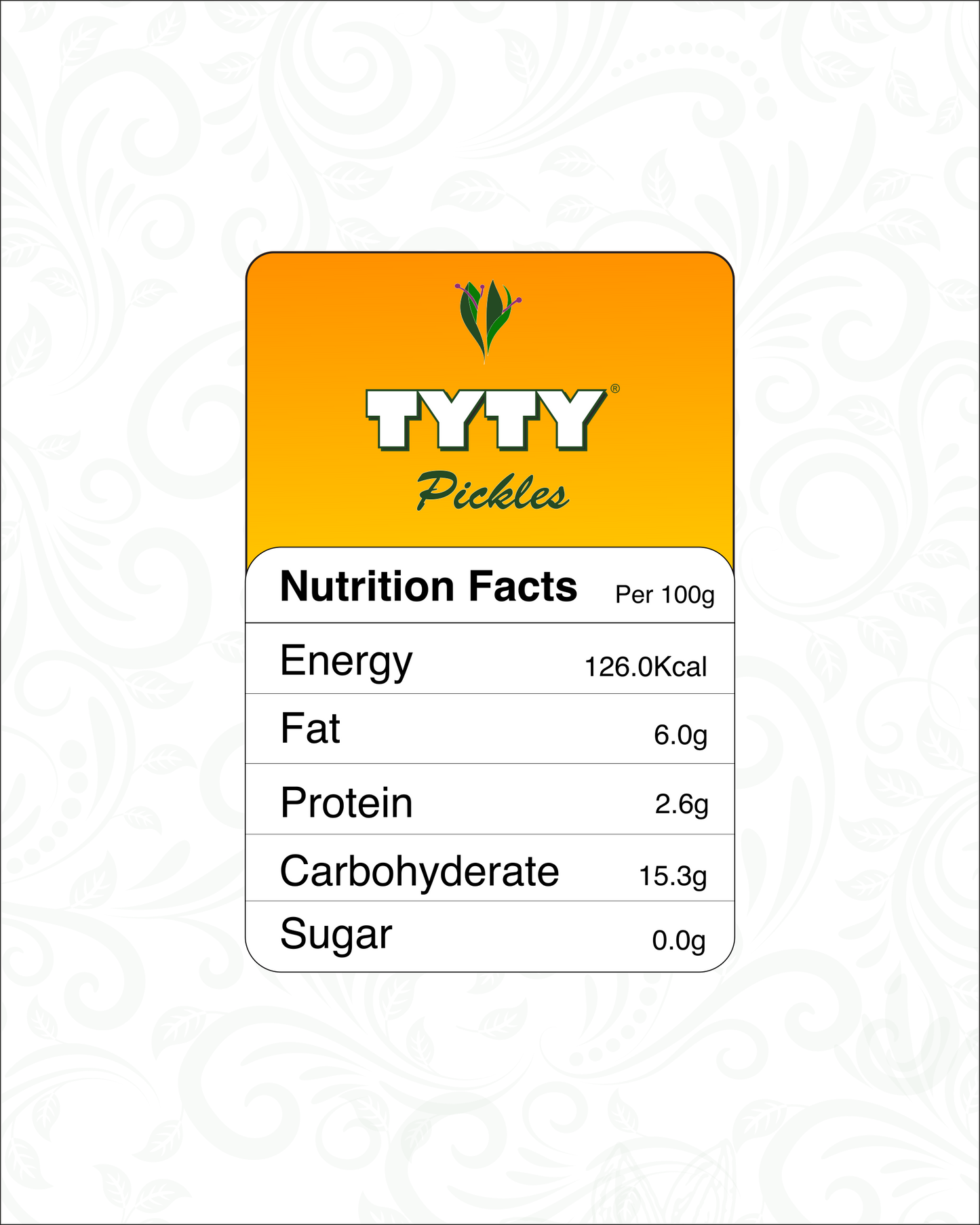TYTY Sciences
PREBIOTIC Khanyari Saag (Collard Greens) Pickle (Kashmiri)
PREBIOTIC Khanyari Saag (Collard Greens) Pickle (Kashmiri)
Couldn't load pickup availability
TYTY Kashmiri Khanyari Saag Pickle is sourced from the breath-taking valley of Kashmir, which is known for the production of Khanyari Saag (Collard Greens). Kashmiri collard greens, also known as haak saag or Kashmiri haakh, are a popular leafy vegetable in Kashmiri cuisine, which originates from the Kashmir region in India. Haakh refers to a variety of leafy greens, and collard greens are one of the types commonly used in Kashmiri cooking.
Collard greens are dark green, leafy vegetables with thick, fibrous stems. They belong to the same family as cabbage, broccoli, and kale.These are also pickled to make the Khanyari Saag Pickle (Collard Green Pickle).
General Approximate nutritional values table for Kashmiri Khanyari Saag Pickle per 100 grams:
- Energy: 126 kcal
- Fat: 6.0 grams
- Protein: 2.60 grams
- Carbohydrate: 15.33 grams
- Sugar: 0.0 grams
Ingredients commonly used in Kashmiri Khanyari Saag Pickle include:
Khanyari Saag (Collard Greens), Mustard Oil, Tomato Extract, Lemon Extract, Kashmiri Vari Masala.
Storage:
Here are some tips on how to store this at home:
Refrigeration: Most pickles should be refrigerated after opening. Read the label to confirm whether refrigeration is necessary. Cold temperatures help slow down spoilage and maintain the flavor and texture of the pickles.
- Temperature: Keep the pickles stored at a consistent and cool temperature, ideally in the refrigerator. Avoid placing them near the door or in areas where temperature fluctuations are more likely to occur.
- Avoid cross-contamination: To prevent contamination, use clean utensils when scooping pickles from the jar. Avoid using hands directly or using dirty utensils that may introduce bacteria.
- Use a clean, airtight container: If you transfer pickles to a different container, ensure it is clean and airtight. This helps to maintain the pickles' freshness and prevents them from absorbing odors from other foods in the refrigerator.
- Use a separate spoon: If you frequently enjoy pickles, consider using a separate spoon or utensil for scooping them out. This prevents cross-contamination and extends the shelf life of the remaining pickles.
Shelf Life:
The shelf life of this product is 12 months .
Some factors that contribute to the distinction of Kashmiri Khanyari Saag Pickle:
Several factors contribute to the distinction of Kashmiri Khanyari Saag Pickle, which sets it apart from other collard green pickles. These factors include:
- Use of Khanyari Saag (Collard Greens): Khanyari Saag, a specific variety of collard greens grown in Kashmir, is the key ingredient in this pickle. The use of locally sourced Khanyari Saag imparts a unique flavor and texture to the pickle.
- Mustard Oil: Mustard oil is a quintessential ingredient in Kashmiri cuisine, including pickles. Its pungent and distinct flavor enhances the overall taste of the Khanyari Saag Pickle and adds an authentic Kashmiri touch.
- Tomato Extract: Tomato extract or pulp is commonly used in Kashmiri pickles to provide a tangy and slightly sweet element. The addition of tomato extract balances the flavors and complements the other ingredients in the pickle.
- Lemon Extract: Lemon extract contributes a zesty and citrusy flavor to the pickle. It provides a refreshing contrast to the earthy taste of the collard greens and adds a subtle acidity to the overall profile.
- Kashmiri Vari Masala: Kashmiri Vari Masala is a blend of spices unique to Kashmiri cuisine. It typically includes a mix of aromatic spices such as fennel seeds, cumin, coriander, ginger, and Kashmiri red chili powder. The inclusion of this masala in the Khanyari Saag Pickle imparts a distinctive Kashmiri flavor and enhances the overall complexity of the pickle.
Health Benefits of Kashmiri Khanyari Saag Pickle:
- Supports Digestive Health: Collard greens contain dietary fiber, which aids in digestion and promotes bowel regularity. The fiber content in the pickle can contribute to improved digestive health and may help prevent constipation.
- Anti-inflammatory Effects: Some components in Khanyari Saag, such as vitamin C and certain phytochemicals, have anti-inflammatory properties. Consuming the Khanyari pickle may potentially help reduce inflammation in the body.
- Immune System Support: The combination of Khanyari Saag, lemon extract, and Kashmiri Vari Masala provides vitamin C, which is essential for a healthy immune system. Consuming the pickle may help support immune function and strengthen the body's defense against infections.
- Weight Management: The high fiber content in Khanyari Saag pickle can contribute to feelings of fullness and help control appetite. Including the pickle as part of a balanced diet may support weight management efforts.
- Anti-cancer Properties: Some compounds found in collard greens, including glucosinolates, have been associated with potential cancer-protective effects. While further research is needed, consuming the Khanyari pickle may offer certain anti-cancer benefits.
Caution:
- Moderation: The pickle is typically tangy and spicy. It's advisable to consume it in moderation, especially if you have a sensitive stomach or are not accustomed to spicy foods. Start with small quantities and gradually increase if desired.
- Sodium Content: Pickles often contain salt for preservation, so be mindful of your sodium intake if you have high blood pressure or are on a low-sodium diet. It's a good practice to balance the pickle consumption with low-sodium food options.
- Allergies and Sensitivities: Check the ingredients list carefully to ensure you are not allergic or sensitive to any of the components in the pickle, such as mustard oil or specific spices. If you have any known allergies, it's recommended to consult the ingredients or prepare the pickle yourself using suitable alternatives.
- Shelf Life and Storage: Pay attention to the shelf life and storage instructions provided for the pickle. Follow the recommended storage conditions (such as refrigeration) and consume it within the specified time frame to maintain its freshness and quality.
- Personal Tolerance: Everyone's tolerance for spices and flavors may vary. Pay attention to your own body's response to the pickle. If you experience any discomfort, digestive issues, or allergic reactions, it's best to discontinue consumption and consult a healthcare professional if needed.








